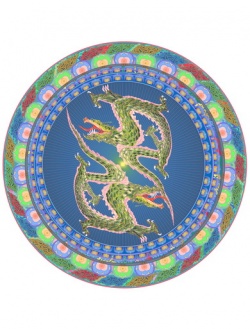Difference between revisions of "Chakravarti-raja"
| (One intermediate revision by the same user not shown) | |||
| Line 1: | Line 1: | ||
[[File:Draak4.jpg|thumb|250px|]] | [[File:Draak4.jpg|thumb|250px|]] | ||
| + | |||
| + | |||
| + | |||
| + | |||
| + | |||
| + | |||
| + | |||
<poem> | <poem> | ||
[[chakravartin]] | [[chakravartin]] | ||
| Line 5: | Line 12: | ||
[[wheel-turning king]] | [[wheel-turning king]] | ||
| − | [[転輪聖王]]・[[転輪王・輪王]] (Skt [[chakravarti-raja]], [[chakravarti-rajan]], or [[chakravartin]]; Jpn [[tenrin-jo’o]], [[tenrin-o]], [[or rin-o]] ) | + | [[転輪聖王]]・[[転輪王・輪王]] (Skt [[chakravarti-raja]], [[chakravarti-rajan]], or [[chakravartin]]; Jpn [[tenrin-jo’o]], [[tenrin-o]], [[or rin-o]] ) An extremely [[fortunate]] being who has [[accumulated]] a vast amount of [[merit]] and as a result has taken [[rebirth]] as a [[king]] with dominion over all [[four continents]] as described in [[Buddhist cosmology]], or, at the very least, over one of the [[four continents]]. At {{Wiki|present}} there are no [[Chakravatin kings]] in our [[world]], and there is no one who has complete dominion over our continent, [[Jambudvipa]]. See Great Treasury of [[Merit]]. |
Also, [[wheel-turning sage king]], or [[wheel-king]]. An [[ideal ruler]] in {{Wiki|ancient Indian}} [[mythology]] who governs with justice rather than force and brings [[tranquillity]] and {{Wiki|comfort}} to the [[people]]. He possesses [[seven treasures]]: [[a wheel]], [[elephants]], [[horses]], [[jewels]], [[jewel-like women]], [[excellent ministers]] of financial affairs, and [[generals]]. He also possesses the [[thirty-two features]] as a [[Buddha]] does, as well as the [[four virtues of great wealth]], admirable features and [[form]], freedom from worries, and long [[life]]. According to some [[scriptures]], when [[Shakyamuni]] was born, a [[hermit-sage]] named [[Asita]] foretold that, if the boy remained in the {{Wiki|secular}} [[world]], he would become [[a wheel-turning king]], but if he renounced {{Wiki|secular}} [[life]], he would become a [[Buddha]]. | Also, [[wheel-turning sage king]], or [[wheel-king]]. An [[ideal ruler]] in {{Wiki|ancient Indian}} [[mythology]] who governs with justice rather than force and brings [[tranquillity]] and {{Wiki|comfort}} to the [[people]]. He possesses [[seven treasures]]: [[a wheel]], [[elephants]], [[horses]], [[jewels]], [[jewel-like women]], [[excellent ministers]] of financial affairs, and [[generals]]. He also possesses the [[thirty-two features]] as a [[Buddha]] does, as well as the [[four virtues of great wealth]], admirable features and [[form]], freedom from worries, and long [[life]]. According to some [[scriptures]], when [[Shakyamuni]] was born, a [[hermit-sage]] named [[Asita]] foretold that, if the boy remained in the {{Wiki|secular}} [[world]], he would become [[a wheel-turning king]], but if he renounced {{Wiki|secular}} [[life]], he would become a [[Buddha]]. | ||
| − | While [[turning the wheel]] he was given by [[heaven]], a [[wheel-turning king]] advances everywhere at will and establishes [[peace]]. These wheels are of four kinds: {{Wiki|gold}}, {{Wiki|silver}}, {{Wiki|copper}}, and {{Wiki|iron}}, the type of [[wheel]] indicating a [[wheel-turning king's]] rank, or the extent of his [[realm]] and power. A [[gold-wheel-turning king]] rules all the [[four continents]] surrounding [[Mount Sumeru]]; a [[silver-wheel-turning king]], the eastern, {{Wiki|western}}, and southern continents; a [[copper-wheel-turning king]], the eastern and southern continents; and an [[iron-wheel-turning king]], the southern continent, or [[Jambudvipa]]. [[Buddhist scriptures]] contain stories of [[Shakyamuni Buddha's]] previous [[incarnations]] as a [[wheel-turning king]]. | + | While [[turning the wheel]] he was given by [[heaven]], a [[wheel-turning king]] advances everywhere at will and establishes [[peace]]. These [[wheels]] are of four kinds: {{Wiki|gold}}, {{Wiki|silver}}, {{Wiki|copper}}, and {{Wiki|iron}}, the type of [[wheel]] indicating a [[wheel-turning king's]] rank, or the extent of his [[realm]] and power. A [[gold-wheel-turning king]] {{Wiki|rules}} all the [[four continents]] surrounding [[Mount Sumeru]]; a [[silver-wheel-turning king]], the eastern, {{Wiki|western}}, and southern continents; a [[copper-wheel-turning king]], the eastern and southern continents; and an [[iron-wheel-turning king]], the [[southern continent]], or [[Jambudvipa]]. [[Buddhist scriptures]] contain stories of [[Shakyamuni Buddha's]] previous [[incarnations]] as a [[wheel-turning king]]. |
</poem> | </poem> | ||
Latest revision as of 11:41, 6 January 2024
chakravartin
wheel-turning king (Skt chakravarti-raja )
wheel-turning king
転輪聖王・転輪王・輪王 (Skt chakravarti-raja, chakravarti-rajan, or chakravartin; Jpn tenrin-jo’o, tenrin-o, or rin-o ) An extremely fortunate being who has accumulated a vast amount of merit and as a result has taken rebirth as a king with dominion over all four continents as described in Buddhist cosmology, or, at the very least, over one of the four continents. At present there are no Chakravatin kings in our world, and there is no one who has complete dominion over our continent, Jambudvipa. See Great Treasury of Merit.
Also, wheel-turning sage king, or wheel-king. An ideal ruler in ancient Indian mythology who governs with justice rather than force and brings tranquillity and comfort to the people. He possesses seven treasures: a wheel, elephants, horses, jewels, jewel-like women, excellent ministers of financial affairs, and generals. He also possesses the thirty-two features as a Buddha does, as well as the four virtues of great wealth, admirable features and form, freedom from worries, and long life. According to some scriptures, when Shakyamuni was born, a hermit-sage named Asita foretold that, if the boy remained in the secular world, he would become a wheel-turning king, but if he renounced secular life, he would become a Buddha.
While turning the wheel he was given by heaven, a wheel-turning king advances everywhere at will and establishes peace. These wheels are of four kinds: gold, silver, copper, and iron, the type of wheel indicating a wheel-turning king's rank, or the extent of his realm and power. A gold-wheel-turning king rules all the four continents surrounding Mount Sumeru; a silver-wheel-turning king, the eastern, western, and southern continents; a copper-wheel-turning king, the eastern and southern continents; and an iron-wheel-turning king, the southern continent, or Jambudvipa. Buddhist scriptures contain stories of Shakyamuni Buddha's previous incarnations as a wheel-turning king.
